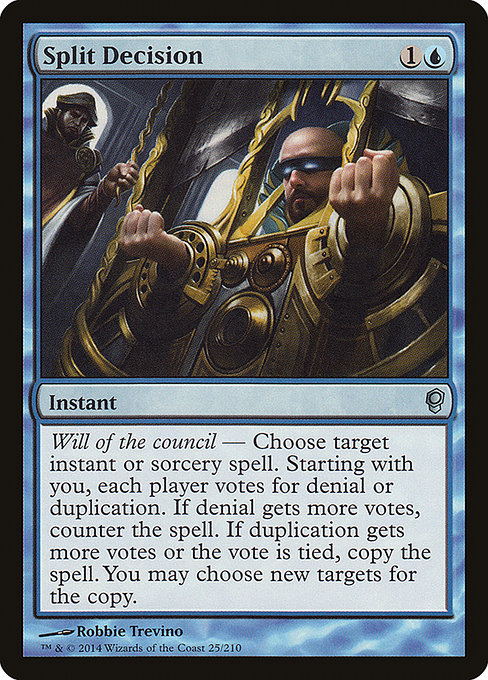
Image courtesy of Scryfall.com
Worldbuilding through a Will of the Council
Split Decision is a tiny spell with a planetary-sized imagination. For an {1}{U} instant from the Conspiracy set, it leaps beyond the usual counterspell or copy-paste control and into a narrative mechanic: a council asks players to vote on whether to deny or duplicate a spell. This is no mere card text trick; it’s a design invitation to explore how power is exercised in a world where magic is a shared, debated resource 🧙♂️. In Conspiracy (CNS), a draft-focused set known for its conspiratorial ambiance, this instant encodes a political moment in a single, elegant flip of a vote. The uncommon rarity hints at flavor that’s flavorful enough to spark stories, but not so rare that only the privileged can own a legend of a momentary parliamentary spell-slinging 🔥.
In a universe where rituals and spells require consensus, the very act of choosing denial or duplication becomes a plot point. The card’s Will of the council blueprint is a microcosm of governance under pressure: start with you, the lead voter, and invite every other participant to weigh in. If denial wins, a spell dies in the ether; if duplication wins or ties, the spell reappears with a twist—an exact copy, but with your control over new targets. The worldbuilding payoff is immediate: every play becomes a scene in a larger drama about influence, alliances, and the ethics of power. 🧙♂️⚔️
Two sides, one world: Denial and duplication as factions
The naming of the two options—denial and duplication—reads like a political fantasy: a council-facing dilemma where dissent can erase a threat, yet consensus can propagate an idea with a mind of its own. In gameplay terms, your opponents are not just trying to resolve a spell; they’re writing the next line of a shared story. If you’re the one who wields Split Decision, you’re effectively moderating a debate where the outcome reshapes the battlefield through counterspell-like force or through a precise, targeted echo of the original spell. The dual outcome encourages a narrative rhythm: do you prefer to stifle danger wholly, or to amplify it in a controlled, copy-enabled way? The latter invites dramatic debates around whose spell is copied, and how those copies could alter the table’s equilibrium 🎲.
World-building through rules and flavor
The card’s mechanics ride on the edge between strategy and storytelling. The copy optionality—“you may choose new targets for the copy”—turns a simple vote into a strategic branching path. Imagine a realm where every powerful spell triggers a chorus of voices; the council’s verdict can redirect the spell’s consequences toward a different target or toward a wider array of players. This is not just about countering a threat; it’s about carving a temporary, shared magic landscape that everyone must navigate. In that sense, Split Decision echoes the political maneuvers you’d expect in a conspiracy-driven world: incentives to align, bluff, and improvise as a cast of characters negotiates the next big act 🧙♂️🎨.
Gameplay strategy for social playgrounds
In practice, you’ll want to deploy Split Decision as a versatile instrument in multiplayer formats where conversations drive action as much as math does. The effect rewards reading the room: who’s ready to back denial, who’s itching for duplication, and how a copied spell might be wielded for maximum value. Pair it with copy amplifiers like other spell-copy effects, or fold it into decks built around political drama and political deck-building—where every curveball from an opponent can be turned into a new story beat. Remember that the vote can change the spell's fate, but the copy also creates fresh lines of play, from targeted removal to asynchronous value loops. It’s the kind of card that makes you grin as you watch the table tilt from a single vote into a cascade of decisions 🎲🔥.
Art, rarity, and the collectible pulse
Robbie Trevino’s illustration for Split Decision captures a moment of tense deliberation—two sides mapping a shared destiny in ink and parchment. The Conspiracy set’s design ethos—draft-invention and conspiratorial flair—shines through in a card that rewards not just clever play, but collaborative storytelling around the table. As an uncommon from CNS, it sits in an accessible niche for players who want flavor without feeling priced out of rarity fever. The market data—roughly a dollar-something in non-foil form, with foils climbing higher—reflects its role as a beloved but not ostentatious centerpiece in many Commander and casual builds. This is a card that doesn't just sit on a shelf; it invites conversation, questions, and what-if scenarios that expand a world beyond the battlefield 🧙♂️💎.
The resonance of a world where magic is debated
Ultimately, Split Decision gives players a mechanism to dramatize governance and consensus in a way that few spells do. It’s a reminder that the Multiverse houses countless cultures where magic—whether it’s a single spell, a council's veto, or a copied incantation—exists within a framework of rules that feel almost political. The result is a game element that’s as much about narrative momentum as it is about card advantage. It invites you to imagine an arc where every vote leaves a trace—on the board, in the history of your playgroup, and in the evolving legend of your favorite worldbuilding moments 🧙♂️⚔️.
While you’re building toward a legendary moment, you might also want to keep your game-night gear looking sharp and ready for action. The Neon Card Holder Phone Case with MagSafe Impact Resistant is a practical companion that echoes the card’s blend of style and durability—bright, dependable, and ready for the next dramatic moment in your living room arena. Click through to explore the product and keep your setup as ready for storytelling as your decks are for combat 🔥💎.